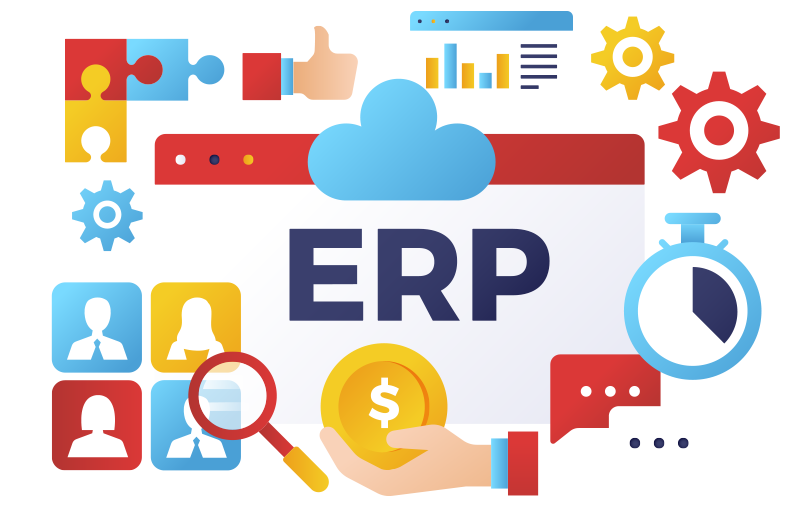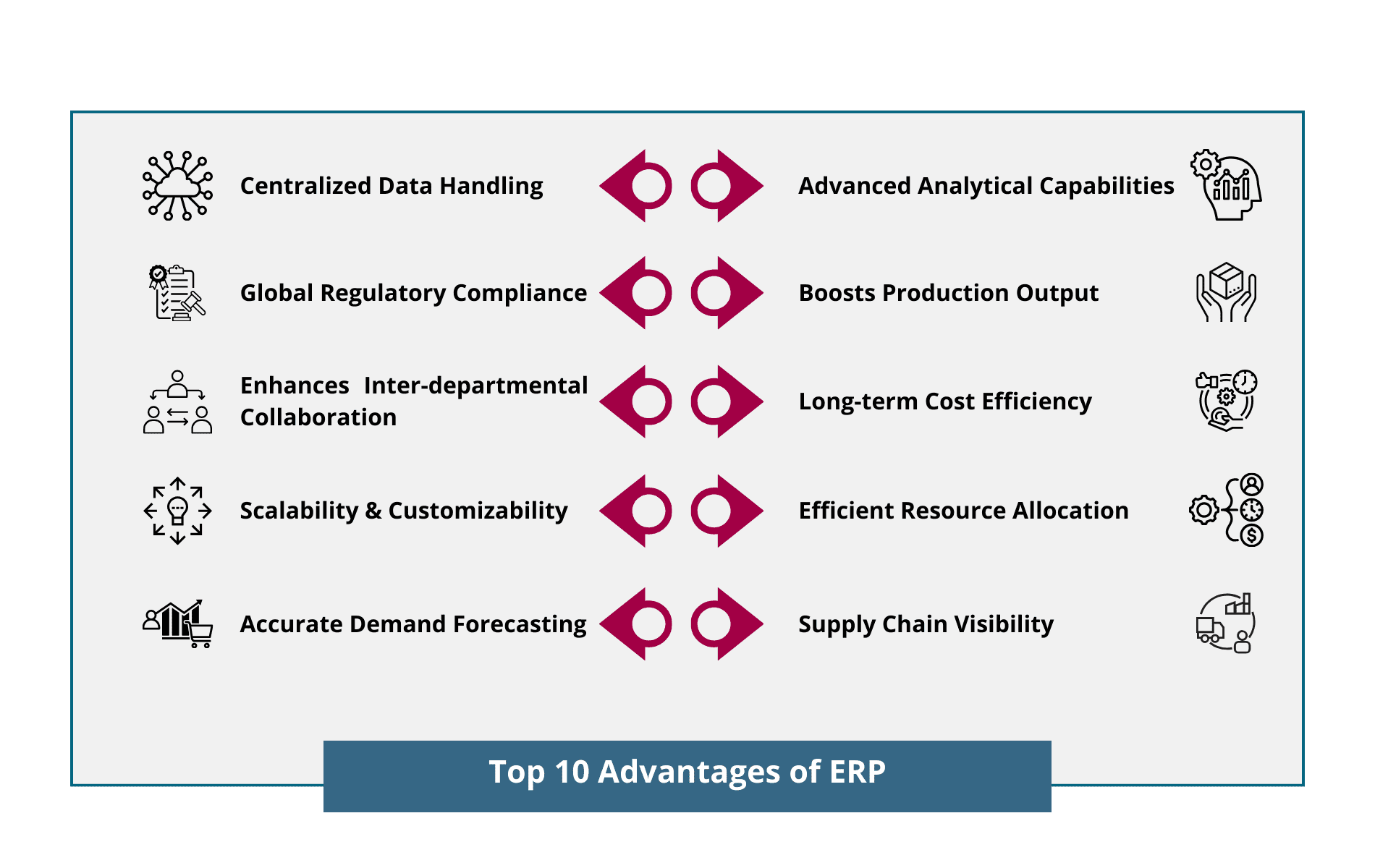Top 10 Advantages of ERP 2025
Create a coherent plan for your business’s success & growth using the remarkable advantages of ERP Software

What is ERP?
Enterprise Resource Planning (ERP) is a complete solution comprising all the functionalities your business needs to automate everyday processes from purchases of raw materials, inventory management, sales & lead management, and customer support tracking, to financial reporting, and gain real-time business intelligence & complete understanding of various aspects of your business.
An increasing number of businesses are implementing ERP Software due to its various advantages. Unlike a legacy tool, it is a full-fledged solution that empowers your business with accurate sales forecasts, efficient inventory planning, warehouse management, project planning, customer relationship management, and much more.
Top 10 Advantages of ERP 2025
1. Centralized Access to Data
ERP supports a centralized system of information management system for all the companies operating under a holding company. Decision-makers can manage all the subsidiary companies separately, evaluate Key Performance Indicators (KPIs), and gain a thorough understanding of their performance in real time.
2. Advanced Analytical Capabilities
ERP comes with Business Intelligence tools. Its powerful analytical capabilities empower decision-makers with predictive analysis which ultimately translates into successful growth strategies. The self-service options allow ordinary employees to generate advanced analytical queries to derive intelligent reports through the use of simple & non-programmatic methods.
3. Global Regulatory Compliance
Best ERP Software in India enables businesses to stay compliant at the global level. With the inclusion of the GRC module in the ERP, businesses will be able to take care of regulatory compliances — Tax compliance, Business Process Automation, Customer protection, Financial Reporting, Audit trails, Sustainability, Value creation, and Traceability.
4. Boosts Production Output
Enterprise Resource Planning tool empowers businesses with powerful production planning capability to unlock greater productivity. For example, ERP for Chemical Industry allows businesses to monitor production activity at every stage, lower factory overhead, maintain consistency in the quality of the output, and ensure your production targets are met on time.
5. Enhances Inter-departmental Collaboration
Information silos — the confinement of data within a department — once threatened the survival of businesses, have been uprooted. Thanks to different ERP modules, businesses can now benefit from instantaneous interdepartmental communication and real-time sharing of accurate information. ERP allows different departments to collaborate and work as a combined unit as a whole.
6. Long-term Cost Efficiency
Even though ERP cost may be a hurdle for many businesses, it pays off in the long term. For example, the Inventory Management System in ERP keeps an eagle’s eye on the inventory levels and automatically notifies you every time the stock level reaches the minimum threshold limit. Similarly, it helps you with inventory planning & forecasting tools to avoid excess stocks and reduce inventory storage costs.
7. Scalability & Customizability
ERP application is flexible and customizable. Meaning, that they can accommodate growing business operations without impacting their speed & efficiency. You can also customize them for your unique organizational needs. You can define employee responsibilities, assign roles, establish processes, configure interfaces, create warnings, set custom alarms, and adapt workflows.
8. Efficient Resource Allocation
Manufacturing ERP Software provides a single system for materials tracking, manpower management, and machinery maintenance repair and overhaul, all of which collectively result in reduced downtimes, lower waste, and increased resource availability. Your business will be in a better position to meet your project timelines through the effective usage of existing resources.
9. Accurate Demand Forecasting
Other benefits of ERP include its ability to analyze historical data, consumer behavior, and market trends & patterns. It ensures your manufacturing schedules align with the changes in market conditions. As a result, executives rely on strongly data-backed information rather than gut feelings.
10. Supply Chain Visibility
ERP for Supply Chain Management brings transparency and end-to-end visibility in the supply chain process from the moment of raw materials procurement till the final delivery of the final product to the customer. It provides seamless integration and connectivity with the Internet of Things (IoT) sensors for real-time freight tracking, freight fuel tracking, and faster route planning.
What are the Disadvantages of ERP?
Each technology has its pros and cons. Much like any other technology, ERP is no exception. It has both advantages and disadvantages of ERP.
1. Upfront Costs
Traditionally, higher upfront costs were a major hurdle while investing in ERP due to license fees and hardware upgrade costs. However, this isn’t a major concern anymore, thanks to cost-efficient Cloud ERP.
2. Customization Complexities
If you invest in a low-quality ERP, it may not support advanced customizations needed to meet your specific business needs.
3. Implementation Delays
It’s possible that the ERP implementation process may get delayed due to poor planning and temporary hurdles.
4. Lack of Motivation
Some employees may prefer working in the traditional way. Regular discussions, meetings, and training could help change their mind.
5. Business Disruptions
If you don’t have a stable Internet connection, you may experience problems connecting to the Cloud ERP servers. However, this issue can be solved by investing in either an On-premise ERP or a Hybrid ERP.
How to Know If Your Business Needs to Invest in an ERP?
Now that we’ve discussed what are the advantages and disadvantages of ERP, let us move on to the next question: Do you really need to invest in an ERP? Look no further, we’ve provided several indications of when you should plan your investment.
1. Data Fragmentation
Let’s say, you’re a pharma business. You’re spending too much time finding patients & drug information. This is leading to inefficiencies and productivity losses. Pharma ERP Software will help you tackle this problem.
2. Unable to Meet Demands
Your business is growing in size and operations. You need a highly efficient system to keep up with the growing demands and meet customer expectations.
3. Lack of Coordination
You’re using multiple legacy systems for different operations. They’re leading to data duplication & a lack of coordination.
4. Human Errors
Human errors in the accounting process are leading to discrepancies that can negatively affect your organization’s trustworthiness, and invite penalties, or legal actions.
5. Lack of Standardization
Let’s say your food business lacks standardization in the quality across different units. Using an ERP for food industry, you’ll be able to meet consistency in the quality across all units & meet your strategic objectives.
Transform Your Business Strategy with Sage X3
In today’s age of highly intensified competition, businesses around the world are turning to ERP to benefit from automation, digital transformation, cross-departmental collaboration, and data-based responsiveness.
Sage X3 is a forward-looking solution for every business — whether small, medium, or large — looking to reshape its traditional activities, get rid of disconnected systems, and benefit from technological innovation. It provides robust customization & integration capabilities and allows you to benefit from smarter workflow, higher order accuracy, faster response time, improved payment processing funnel, and increased growth potential. It is a single solution for the roadmap to your business’s success.
Top Industries Leveraging ERP Software
Food & Beverage
Alcohol
Pharmaceuticals
Advertising
IT Services
Furniture
Manufacturing
Auto Ancillary
Pharma Trading
Packaging
Medical Device
Chemical
Plastic
Brewery
Logistics
Automotive
Frequently Asked Questions
1. What are the Strategic Advantages of ERP?
Here are the strategic advantages of using an Enterprise Resource Planning tool:
1. Process standardization across different departments
2. End-to-end visibility & transparency in the business functioning
3. Meet your production needs with Material Requirements Planning
4. Timely access to personalized reports and customized dashboards
5. Accurately forecast sales & meet customer expectations using a Sales Management System
2. How Does ERP Contribute to Higher Employee Productivity?
There are several ways an ERP contributes to higher employee productivity:
1. Reduces manual work & redundant efforts through automation
2. Reduces data disorganization and mismanagement by creating a centralized database
3. Facilitates powerful planning, forecasting, and analytical tools
4. Promotes inter-departmental collaboration and instantaneous information sharing
5. Provides clear visibility of every aspect of the business operations
3. What are the Compliance Benefits of ERP?
ERP offers numerous compliance benefits. Some of them are as under:
1. Track new financial regulations and stay up-to-date about the latest happenings
2. Lower the risk of negative credit ratings, and digitally handle all payables using AP automation
3. Reduce human errors while compiling financial statements and maintaining audit trail
4. Comply with the industry norms to keep customer data safe & encrypted
5. Automated quality control mechanisms to conform with product quality standards
4. How Does ERP Enhance Customer Satisfaction?
Imagine you’re a furniture manufacturing business. ERP for Furniture Manufacturing will make your customer data (such as their personal information and past purchases) accessible from a single place. Its integrated CRM System will help you build stronger relationships with your customers, digitize customer experience, and assist them with any queries they may have. With instant access to customer data and the right tools, your employees can engage in meaningful conversations, and provide personalized relationships to your customers for maximum satisfaction.
5. Which Type of ERP Should I Choose?
There are different types of ERP. You should choose an ERP that suits the unique requirements of your organization, and the size & nature of your business operations.
1. On-premise ERP: Best for large enterprises with complex operations that need better control over their data and higher customizability.
2. Cloud ERP: Best for small and medium-sized businesses with limited resource availability looking to scale quickly & benefit from remote data accessibility.
3. Hybrid ERP: Best for organizations looking to experience the flexibility & convenience of the cloud while retaining limited control over their data, or planning to migrate to a fully cloud solution.
Schedule Product Tour
"*" indicates required fields
